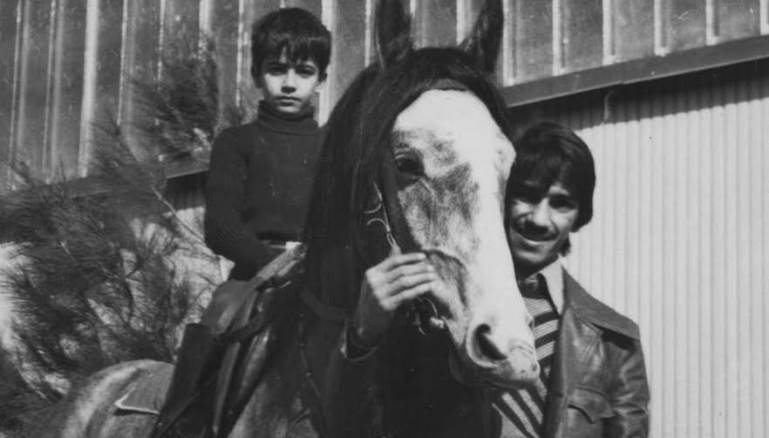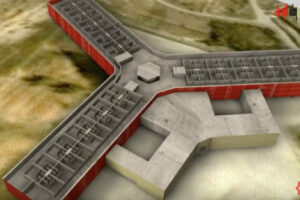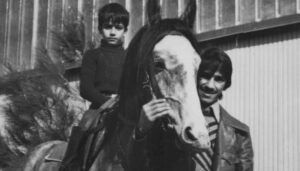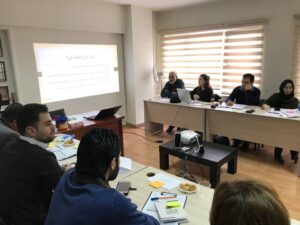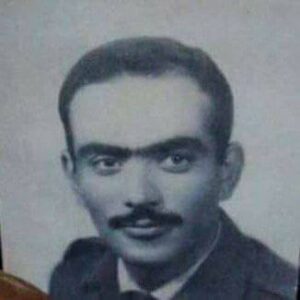Fate brought me together with the Golden Knight, Adnan Qassar, in Seydnayah Military Prison in 2008. Just a few days before the massacre committed by the Syrian military police, I heard from other inmates about “Abu al-Tit,” an abbreviation of the name “Abu Tawfeeq,” as he preferred to be called. This information was shared with me by prisoners who had spent years alongside him in the grim conditions of Tadmur (Palmyra) Military Prison. Every detainee had one story about the man, always summarized in one word: he is “a true knight.”
I couldn’t have fathomed that the man truly embodied the spirit of a knight. While he might have been skilled in horse riding and equestrian sports, he didn’t necessarily fit the moral image of a knight. This ambiguous perception of him lingered in my mind until it didn’t anymore when our encounter occurred in sector A on the second floor of the red building at Seydnayah Prison. Our journey persisted within the same ward until the military police relocated us to the Damascus Central Prison, “Adra,” after we were transferred there following the end of the massacre.
Despite Abu Tawfeeq’s simplicity and humility, he exuded the nobility and dignity of a true knight. He refused to tolerate injustice towards anyone and could not bear witness to the humiliation and suffering inflicted upon us by the military police forces. Throughout the day, you would find him among the prisoners, moving from one room to another, engaging in conversations, and attentively listening to their grievances. This was true even though a significant number of them hadn’t endured even a quarter of the time in prison that “Abu al-Tit” had experienced while shuttling between various prisons within the Assad family’s domain. He extended his deep true empathy and love to everyone without sharing his own story, mindful not to add more burdens to the already heavy loads carried by fellow prisoners.
Adnan was arrested in 1993, several months before the car accident that claimed the life of Bassel al-Assad in early 1994. The basis for Adnan’s arrest stemmed from his surpassing of Bassel, rightfully earning him the title of the Golden Knight. This rivalry escalated, ultimately leading Adnan to the darkness of the Palestine Branch’s underground cells. It was there that the branch’s head conveyed to him, “Your words are too sharp, and the higher-ups want to temper your spirit.” Consequently, the decision was made to transfer Adnan to Seydnayah Prison, a notable contrast to the grim conditions of Tadmur (Palmyra) Prison during that period. Sednayah was often referred to as the “Sheraton Hotel” among the prisons affiliated with the Assad family regime. However, Adnan’s stay in Seydnayah was relatively brief. Following the demise of Bassel al-Assad, a group of prison guards forcibly took him from his dormitory, subjecting him to physical abuse and verbal insults. This marked the beginning of Adnan’s transfer to Tadmur (Palmyra) Prison, where he faced charges of “attempting to assassinate Bassel al-Assad.”
The Knight endured eight grueling years in Palmyra, subjected to the most horrific forms of torture and humiliation. These acts were a blatant attempt to shatter the indomitable spirit of the knight within him. However, with each blow, insult, and broken rib, that spirit only grew stronger and more resilient.
Then, one day, the nightmare of Palmyra came to an end, and Adnan, along with the other inmates, returned to the relative comfort of Seydnayah. But this marked the beginning of a new chapter of suffering under the leadership of the young President Bashar al-Assad.
Efforts were made by human rights, humanitarian, and sports organizations to intervene, and in 2005, a mediator sought a direct meeting with President Assad to discuss Adnan’s case. However, the response from the young president was shockingly rude and heartless. He retorted, “I never entered Adnan’s prison, Bassel did. If you want Adnan out, go and resurrect Bassel to do it.” This cruel response crushed the hopes of the detainees, but it failed to extinguish the knight’s spirit within Adnan. It only fueled his determination to reunite with his two children, Tawfeeq and Maria. When Adnan spoke of them, it was always with the affection reserved for a parent talking about their beloved children.
Today, a whirlwind of emotions fills Adnan’s heart—a yearning for freedom and the prospect of reuniting with his family after years of separation, and a profound sorrow and anguish for his fellow cellmates like Ragheed, Walid, Bashar, Faisal, and countless others who endured years of isolation alongside Adnan and continue to do so.
Adnan…they may have succeeded in taking away your physical freedom, but they could never extinguish the noble spirit of the knight that resides within you. May your freedom be blessed, dear knight.
Omar Al-Abdullah
Al-Modon Newspaper
June 16, 2014

